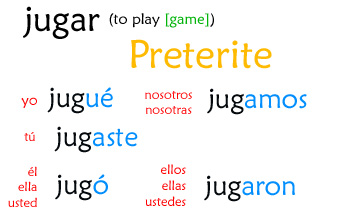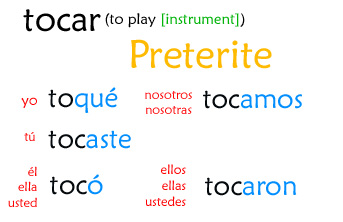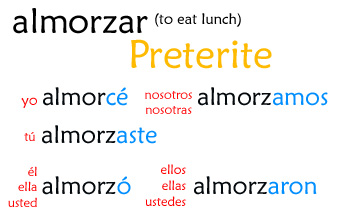Hola. In this lesson we’ll be continuing the preterite of AR verbs. Although we covered the normal verbs in the previous lesson, if a verb ends in -gar, -car, or -zar, we have to treat it specially in the yo form. So please watch and find out how it works! Let me know if you have any questions.
Hope it was helpful. Please let me know if you have any questions, comments or suggestions!
Check out the preterite conjugation sheet if you’d like a summary of the preterite!
Vocabulario:
esperar – to wait (for); to hope

jugar – to play [game]
yo juego – I play [game]
yo jugué – I played [game]
pagar – to pay (for)
yo pago – I pay (for)
yo pagué – I paid (for)

tocar – to play (instrument)
yo toco – I play
yo toqué – I played
buscar – to look for
yo busco – I look for
yo busqué – I looked for

almorzar – to eat lunch
yo almuerzo – I eat lunch
yo almorcé – I ate lunch
cazar – to hunt
yo cazo – I hunt
yo cacé – I hunted
comenzar – to start, begin
yo comienzo – I start, begin
yo comencé – I started, began
empezar – to start, to begin
yo empiezo – I start, I begin
yo empecé – I started, I began
*cue would be pronounced “kway” and not “sway”
—————————-
Related Video(s):

Love the videos! Could you do a song that is over this and one over regular ar,er and ir verbs in the preterite?
You are so good. I couldn’t learn how until I watched your video! Gracias and btw my whole Spanish class watches you like everyday! 🙂
Muchas gracias Sr. Jordan!
I am so grateful for your hard work and your openness to share.
I love these videos and I use them in the classroom on a regular basis….I also make guided worksheets to go along with videos! It makes for a whole class period and a great lesson plan.
Por que tu no tienes los conjugaciones de vosotros?
Cue would not be pronounced sway but kway like in cuello, cuelgo, cuestión, etc. If you can fix that on this video, that would be nice. Thanks so much! I really appreciate your hard work which is so helpful for all of us! Great job!
Gracias mucho!!!!!!!!!!!!!!!
Love, love, love your videos! Thank you! Silly note, though — you put almorzar (u-ue) when it should be (o-ue). =)
I’m addicted to these videos and will probably remain faithful to them until I’m fluent!
What a amazing program you’d produced!
You do me s great service by this site .
In any case I swear I’ll check you every day,and
I’d like to get your fantastic T-shuts!
See you!!!
Ola otra vez. Yo nota que la palabra es uso tambien como “touch”. ?Esta correcto a decir algo como? “No toca la pastel” (Don’t touch the cake).
Gracias otra vez.
SÃ. Tienes razón. Tocar se puede usar en las dos formas.
1. Tocar un instrumento
2. tocar (el sentido).
Para ayudarte con el mandato:
(tú) ‘no toques el pastel’
(usted) ‘no toque el pastel’
(ustedes) ‘no toquen el pastel’
y quizás puedo tener videos de eso en el futuro.
Gracias Senor. Tengo el libro de 501 verbos. Yo encontre los ejemplos de tocar para el “imperativo”.
Toca, no toques……..
Gracias Senor.